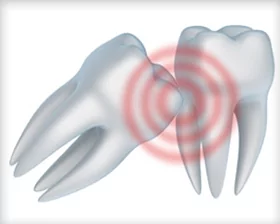What Are Wisdom Teeth?

Wisdom teeth are third molars that grow at the very back of your gums. Wisdom teeth are the evolutionary remnants of our ancestors’ diets, which necessitated robust molars for grinding down tough foods. Named for the time of life they appear, typically aligning with an age when individuals are growing wiser, these third molars emerge at the back of the mouth.
Although the standard number is four, there’s a notable variation in how many wisdom teeth each person might develop, with some individuals having less or even none. They often make their appearance in the late teens or early twenties, although they can emerge later, frequently leading to dental complications due to limited space in the fully formed jaw. This often leads to needing these teeth extracted.
At Blaisdell Family Dentistry, our dentists are skilled in carefully removing these extra teeth to keep you out of pain and in top oral health!
What Are Impacted Wisdom Teeth?
Because wisdom teeth are the last teeth to come in it is quite common that once they finally erupt they come out at a strange angle or get stuck and only partially break through the gums. Impacted wisdom teeth are those that are obstructed from erupting properly. This common issue arises due to the lack of space in the mouth, forcing the teeth to grow at an angle, sometimes even horizontally, or to become trapped below the gum line.
Such impaction can cause a range of dental issues, including misalignment of neighboring teeth, chronic jaw pain, and the formation of cysts. The degree of impaction—whether the teeth are partially or completely trapped beneath the gum — can significantly influence the urgency and approach to any necessary extraction procedure.
Why Extract Wisdom Teeth?
We often recommend tooth extraction due to potential and actual dental health issues that arise from their awkward placement in the mouth. Here are some of the main reasons:
- Partially erupted wisdom teeth create an opening for bacteria to enter the gums around the tooth and cause an infection, which can lead to pain, swelling, jaw stiffness, and general illness.
- The difficulty of cleaning impacted teeth increases the risk of developing a painful condition called pericoronitis, which is an inflammatory gum condition that occurs around the wisdom teeth.
- Impacted wisdom teeth can also lead to the formation of cysts, which can damage bone and gum tissue.
- They can also crowd or damage adjacent teeth or roots, sometimes leading to tooth misalignment.
Considering these risks, extraction can be a preventative measure to protect the overall health of your mouth. If you’re experiencing issues with your wisdom teeth, it’s essential to consult with a dental professional to determine the best course of action.
How Do We Evaluate Wisdom Teeth?
As part of regular dental exams, we examine your wisdom teeth and make certain they are healthy. If you have a toothache or discomfort, we will examine you and determine whether you are in need a wisdom tooth removal. We will x-ray your wisdom teeth to determine if infection is present and whether or not to proceed with wisdom teeth extraction. If your wisdom teeth are impacted but no disease is present the teeth most likely do not require extraction. The fact of the matter is that there is no proven benefit to wisdom teeth extraction if the wisdom teeth are healthy.
“I had to get an emergency wisdom tooth extraction due to a very bad infection that randomly started. Dr. Lynn Blaisdell And his son Craig (along with the amazing front staff of course) made this MUCH easier than it could’ve been. Quick, responsive, and they really do care about your well being after you’ve been helped. I will be recommending this office to anyone in need of dental work. 10/10 guys. THANK YOU!”
MASON L.
How is Wisdom Tooth Extraction Performed?

Wisdom teeth extraction is done surgically. The procedure may be done in the office and in some cases may require the surgery to be performed in the hospital. Most of the time a local anesthetic is used to numb the tooth and the surrounding area. If the tooth hasn’t come through the gum a small incision is made in the gum to access the tooth. Sometimes a small piece of the bone covering the tooth has to be removed through our wisdom tooth removal services. The surgeon may break up the tooth into smaller parts to make it easier to take out through the opening.
If the tooth has partially or completely broken through the gums our wisdom teeth extraction process will be easier because there is less need to make an incision.
Aftercare Guidelines
The exact process depends on your unique situation. We will walk you through the process and after the extraction is completed we will provide specific follow-up care instructions. Some common notes include the following:
- Most surgeons in the Meridian or Boise areas use dissolvable stitches to seal up the gums, so you won’t need to come back to have the stitches removed.
- Oftentimes, gauze is placed over the site of the extraction and you are asked to keep the pressure on it by biting your lower jaws together for up to an hour to allow a blood clot to form in the empty tooth socket. Blood clots are a part of the natural healing process and should not be dislodged. Avoid using straws until you’ve healed as the sucking motion can dislodge those blood clots.
Questions? Need to Schedule a Wisdom Tooth Extraction? Contact Us in Boise Today!
Questions about wisdom tooth extraction? Looking to schedule an evaluation? Simply call, text, or email us today to talk to our team!




